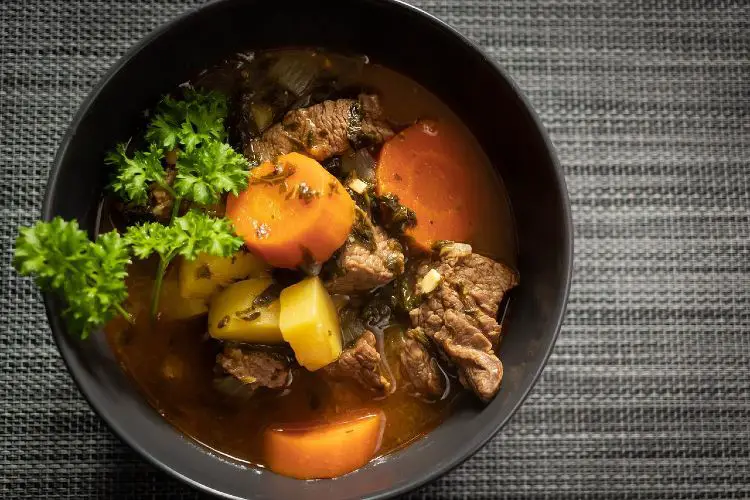Can You Freeze Beef Stew?
Quick Answer : Can You Freeze Beef Stew?
Yes, you can freeze beef stew. Though freeing beef stew is not a significant issue, it requires a proper preparation. So, you can freeze it safely after taking the necessary precautions. Once frozen, the beef stew can remain fresh for a considerable period. So, you can consume it at leisure. Therefore, if you have stacked up a substantial quantity of beef stew, you can consider freezing it as the ideal preservation method.
How Do You Freeze Beef Stew?
Though you need to prepare beef stew for freezing, it is not an elaborate process.
- We recommend cooling the beef stew thoroughly to room temperature before freezing it. Freezing hot or warm stew can have undesirable consequences. The condensation effect can cause moisture buildup inside the vessel and dilute it. Besides, placing hot food inside the freezer can increase the freezer temperature and spoil other foods freezing inside.
- However, placing the beef stew at room temperature can cause bacterial growth. Therefore, the ideal method is to dip the pot of beef stew in ice water for 10 to 15 minutes. It allows the stew to reach room temperature quickly.
- If you have added the vegetables to the beef soup, we recommend them to be undercooked. However, they can be cooked fully during the reheating process.
- Meanwhile, prepare the ideal containers for freezing the beef stew. You might need a big airtight container if you have a large batch. Otherwise, you can use small plastic airtight containers to freeze the beef stew in consumable portions. It proves helpful when defrosting the frozen beef stew.
- Once cooled, portion the beef stew into small containers for one-time consumption. Please leave sufficient space at the top because the liquid expands when freezing. The lack of space can cause the stew to spill over and mess up the freezer.
- Seal the containers well and stick the date label. We advise placing the containers on a level ground inside the freezer to prevent them from toppling over and causing the stew to leak.
Adding cornstarch or flour to the beef stew can thicken it, but they also tend to separate when freezing. Therefore, we advise adding these thickening agents after defrosting when the stew is ready for reheating.
Similarly, we advise keeping the potatoes from the beef stew until reheating because potatoes can become grainy when frozen and defrosted.
Freezing Beef Stew With Dumplings
Dumplings do not freeze well. Hence, we do not advise adding the dumplings to the beef stew until it is ready for consumption. In addition, dumplings can lose their texture and flavor, causing them to separate and fall off during the reheating process. Therefore, we suggest adding the dumplings right before you eat them.
How Long Can You Freeze The Beef Stew In The Freezer?
The frozen beef stew can last for four to six months without losing its texture and flavor. However, you should have frozen it in airtight containers. Air seepage can cause bacterial contamination, and the beef stew can get spoilt. Though you can consume beef stew even after six months, the flavor would be lost, and the stew would taste bland.
How Do You Defrost Beef Stew?
The traditional method of defrosting the frozen beef stew in the refrigerator is ideal. First, you transfer the frozen stew from the freezer to the fridge. The difference in the temperature levels allows the beef stew to defrost gradually and naturally. This method ensures the absorption of all the essences in the stew ideally. However, it takes considerable time. So, you need to start the defrosting process overnight.
If you have time issues, you can consider the following alternatives.
- Defrost the beef stew in a saucepan. However, we advise running the freezer container under hot water for some time.
- Alternatively, you can microwave the beef stew at defrosting settings. It is the fastest method to thaw the frozen beef stew.
Both these methods serve to reheat the soup simultaneously. However, we recommend keeping the stovetop at low heat and stirring the soup continuously to prevent it from getting burnt. Similarly, we advise stirring the soup inside the microwave to avoid clump formation.
You can add potatoes during the reheating process.
Can You Refreeze The Beef Stew?
We do not recommend refreezing beef stew because its texture and flavor changes can be irreversible. As a result, the stew would lose its taste and become bland.
Can You Freeze Beef Stew With Potatoes In It?
Potatoes do not have a good reputation for freezing well. They tend to become grainy after freezing. The grainy texture can damage the beef stew’s texture. So, we do not recommend freezing beef stew with potatoes in it.
Can You Stew Beef Stew With Carrots?
Carrots should not be an issue because they freeze well. However, we recommend undercooking the carrots while freezing the beef stew. Then, the carrots can cook thoroughly when you reheat the stew after defrosting.
Can You Freeze Beef Stew And Dumplings?
Dumplings are not good at freezing. They tend to separate. Therefore, we do not advise freezing beef stew with dumplings. Instead, you can add the dumplings finally after reheating.
Can You Freeze Beef Stew After Cooking?
Yes, it is possible to freeze the beef stew after cooking. But, please ensure that the vegetables are half-cooked. Otherwise, they can become soggy during freezing and thus, affect the beef stew’s texture.
Can You Freeze Beef Stew With Potatoes And Carrots?
While freezing beef stew with potatoes is a strict NO, you can freeze it with carrots. Carrots are better at freezing than potatoes.
Can You Freeze Beef Stew With Mushrooms?
You can freeze beef stew with mushrooms. As usual, please undercook the mushrooms as they can turn mushy otherwise. Then, pour the contents into a freezer bag. Remove air and seal it before freezing it in the freezer.
Can You Freeze Beef Stew Leftovers?
Leftover beef stew is fully cooked with vegetables. So, it is not ideal for freezing. However, if you can remove the vegetables like potatoes from it, you can freeze beef stove leftovers. If you have used mashed potatoes, there should be no problem freezing beef stew leftovers.
Final Thoughts
Beef stew is a filling dish. So, you might have prepared excess beer stew that you might not consume in a single sitting. The best storage option is freezing after taking the necessary precautions.



